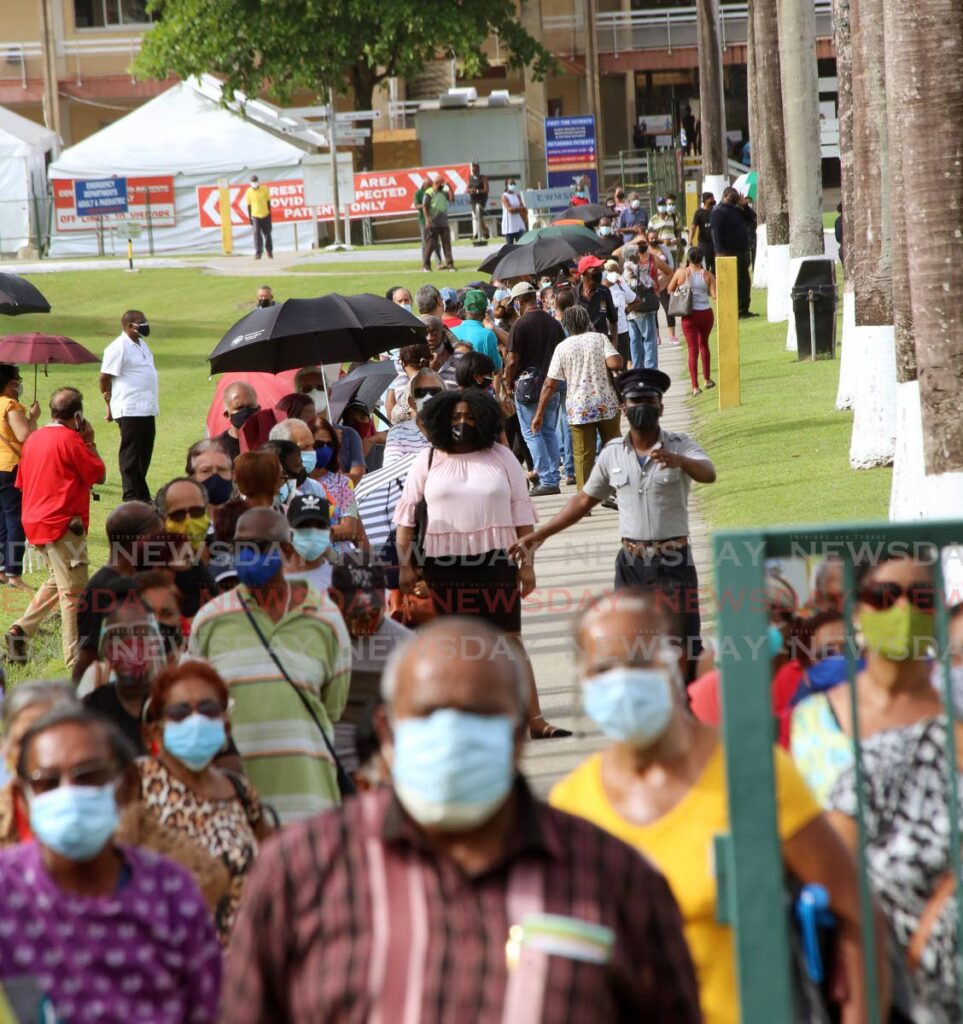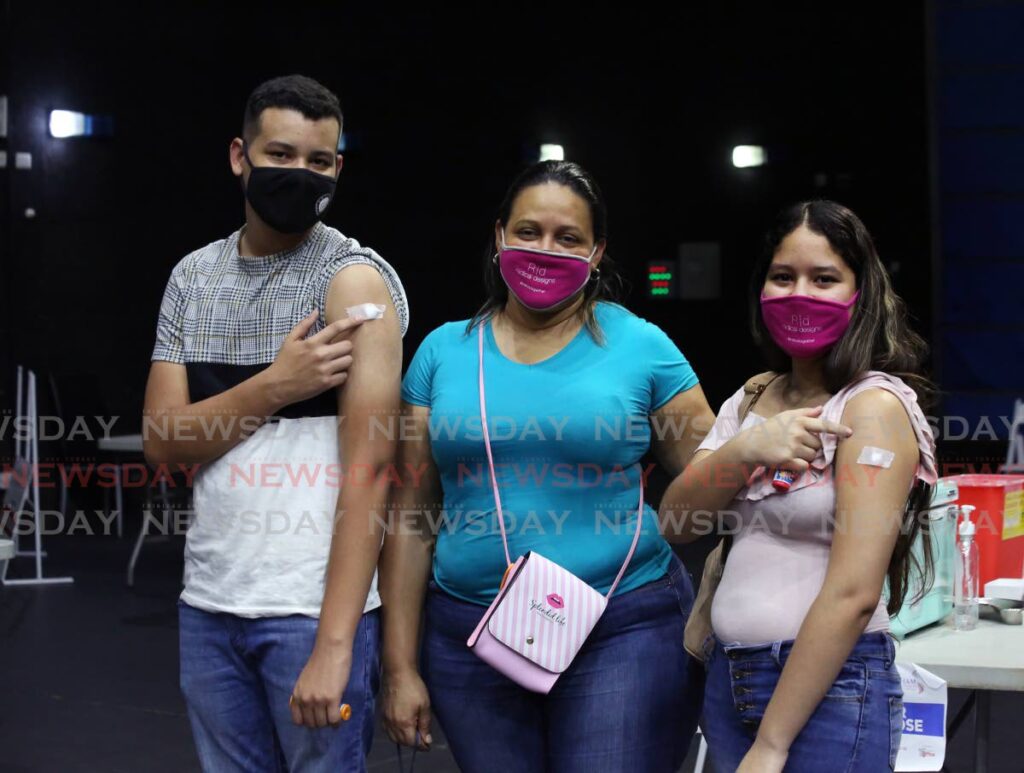ICU staff: Get vaxxed, for our sake and your own

Frustrating. Traumatising. Exhausting. That’s how doctors and nurses in the ICU departments of the covid19 parallel health care system describe the conditions and circumstances they face working with ill patients daily.
Patients in these facilities are only admitted when they have low oxygen levels. Putting them on oxygen and then a ventilator, depending on their oxygen saturation, is done based on the clinical status of a patient, with their consent.
House officer at the Couva Medical and Multi-training Facility ICU Dr Thais Razark said many patients who come into ICUs are reluctant to accept they are sick enough to need medical attention, and insist they feel fine.
She said moving a patient from one level to another is a process of step-up management, which depends on how much oxygen they need.
Normal levels of oxygen saturation are 95 per cent and above.
“For example, a patient may come into the hospital accident and emergency department with a cough and shortness of breath. Their oxygen saturation may be 85 per cent on room air, so the doctors would put them on a facemask to receive supplemental oxygen. There are different face masks that can give different levels of oxygen support, with the highest level being a non-rebreather face mask (NRFM) that gives 15 litres per minute of oxygen. We have started using dual-therapy oxygen, where we use a NRFM and a nasal cannula.”
She said a team of doctors – house officers, registrars and consultants – decides how and when a patient needs more oxygen.
“If patients are on the highest level of oxygen, their oxygen saturations are still below the accepted level, and they are short of breath, we would start them on continuous positive airway pressure (CPAP) via the ventilator. This requires a facemask that is strapped onto the face tightly to create a seal, as air is pushed into the lungs to help them open up and improve their ability to breathe. CPAP is usually alternated with the NRFM and/or dual therapy.
"If they do not improve with this and become CPAP-dependent, meaning they cannot maintain their oxygen saturations without the CPAP, or despite the oxygen therapy their oxygen saturations remain low and their breathing rate remains high (short of breath), then we would opt for intubation, where the ventilator would be doing the work of breathing for the patient.”
She said the decision to be put on CPAP or intubated would be based on the clinical status of the patient, but it was ultimately the choice of the patient and done with his or her consent.
“Sadly, many patients are reluctant to attempt the CPAP, and often refuse intubation. They would insist that they feel fine and don’t need any medical attention – yet here they are in the ICU/HDU with low oxygen saturations.
"Many times, doctors and nurses have to beg patients and even hold their hands to go back on the CPAP, explaining over and over that it’s for their betterment. However, patients still refuse until it’s too late. We counsel them on intubation, and that it’s a very invasive procedure – hence why it’s the last escalation of care – but they refuse until it’s too late.”
Razark said she is frustrated by the attitude of some of the patients who come into the ICU.
“We explain to patients that once you are stepped up to ICU/HDU, you are considered high-risk, and death is a very real possibility.
"Unfortunately, we do still have patients coming in unvaccinated. Oftentimes, those are the patients who refuse care the most, insist that we are all trying to kill them, and then wait until they are at death’s doorstep to decide that they want it all – vaccine, medication, intubation etc.
"But at that point it’s too late. It’s very frustrating.
“I’ve been in the ICU for the past year and a half, dealing with many deaths – from old to young, with medical conditions, to fit and healthy. Honestly, I have become very numb to it all.”
At the Arima General Hospital ICU, a nurse said generally ICU nurses work eight-12-hour shifts, most of which is spent in the "hot zone" caring for patients.
“You go in for six-seven hours, monitor the patients, do all the tidying and nursing care aspects, do your paperwork, and then you get relieved after that. There should be someone taking over for you, but sometimes colleagues come in late, or people are absent, so you have to cover for them.”
She said the long hours contribute to the burnout of nursing personnel, as well as the lack of staff to take care of the large numbers of patients coming into the ICU.
“It’s not one-to-one care, as you would expect. No one catered for this on such a large scale. So you don’t have so many ICU nurses and there’s a lot of untrained nurses – as in, rather than the one-year training that is expected, we just have crash courses that we give nurses when they come. So that makes it a little bit difficult for them to deal with (it), not having all the skill sets to manage the patients.”
She said the constant deaths, as well as helping patients face their anxiety, were contributing to the trauma nurses faced.
“It’s still traumatising when patients die. That freaks staff out from time to time, especially when you have a conscious patient and then they have a turn for the worse.
"That happens often these days with our covid patients, that’s one of the pitfalls. And that could be traumatising, especially when you tell a patient, 'I’ll see you in the morning,' and you come back and they died during the night, that kind of thing – and that’s been happening a lot.”
She said nurses are often faced with having to comfort patients when they come into the ICU, especially when they are conscious when they're admitted.

“A lot of the patients are anxious once they come in conscious, because being in a setting like this is not the norm for conscious patients. So they’re very anxious seeing other people on tubes, when a patient crashes, all those things, and they think about their state and how it is for them, so that brings forth a lot of anxiety, which is traumatising for them, and contributes to their deterioration and worsened state.”
She said the process was also hard on patients because they are not allowed visitors.
“I think that’s the hardest for them, because they always have their phones with them, wanting to know what is going on at home, what is happening with their loved ones and what they’re thinking and seeing. That adds to the anxiety, not being able to have visitors. It’s very hard.
“As nurses you think about the loved ones, having to call, the anxiety that they go through, and that makes you anxious too, because you know the patient is not well, you don’t know what to tell them.
"Of course, we don’t respond to them when they ask us these questions, we forward them to the doctors to have the discussion, but more or less it’s traumatising. If they’re really bad psychological-wise, they will be referred to psychology, and psychologists will come and talk to them. But that does not mitigate what’s happening most of the time.”
She said the two things she would urge the public to do to avoid becoming patients in the ICU were to get vaccinated and live healthier lives.
“One of the things we have noticed is that 95 per cent, at a rough average, are unvaccinated. Those are the ones especially who are there with us and don’t make it out. That in itself tells us a lot about this situation.
"While we do get five to ten per cent vaccinated that may come to the ICU, more or less they would have dire comorbidities that contribute to the fatalities.
"So I’d advise the public that getting vaccinated not only reduces hospital stays, but the likelihood that they will enter the ICU and result in death.”
As for becoming more health-conscious, she said, “There’s a lot of lifestyle diseases people have, so this would be a good time for them to make some changes in their lifestyle: eat better, choose meals, avoid fast foods, make better choices, exercise.
"Even us as nurses, many of us have to make that decision. I personally have to engage in my exercise, try to eat well – I do my own cooking, I’m not a person to purchase food outside, so that helps me.
"While I have not contracted covid19, I don’t know what might happen in the future. But working there, I need to set myself as best I can, So far it has worked and I’m hoping it continues that way.”
She said she is vaccinated, as are most of the nurses who work with her in the ICU.
“There will always be a few who really don’t want to, and for whatever reason, everyone has their ideas. People have their personal views (on) vaccination, which has nothing to do with any medical or scientific reasons.

"I went with some of my colleagues earlier this year and we all got vaccinated, because we recognise the importance of it and we’ve taken it.”


Comments
"ICU staff: Get vaxxed, for our sake and your own"